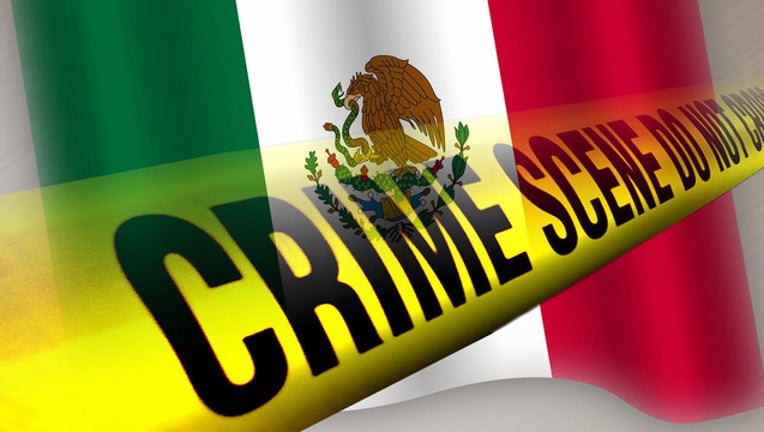Vigilantes, mob justice grow as violence mounts in Mexico

MEXICO CITY (AP) - Vigilante attacks and mob justice appeared to be on the rise in Mexico this week as violence mounted, two dozen bodies appeared along roadsides and the government ruled out any new crackdown on criminal gangs.
Prosecutors in the northern state of Sinaloa said Thursday five young men have been murdered in recent days, and in all five cases toy cars were carefully placed atop their corpses. The men were apparently car thieves, and the toys indicated both the reason they were killed and served as a warning to other thieves.
The latest such murder came Wednesday. Prosecutors said the victim had been identified as the same man seen on security camera footage earlier that day stealing a pickup truck at gunpoint from a woman outside her home in the state capital, Culiacan.
That same day, a total of seven suspected kidnappers were killed by townspeople in the largest mass lynching in recent memory in the central state of Puebla. Some were beaten, some hanged.
The National Human Rights Commission said 43 people have been killed in lynchings so far this year, and 173 injured. That was up from the already-record year for mob justice in 2018.
"Those who take justice into their own hands commit acts of barbarism, not justice," the commission said.
Vigilantes say they have to act because authorities won't crack down on criminal gangs, which have become more brazen and have begun returning to the grisly mass executions that marked Mexico's 2006-2012 drug war.
On Thursday, the notoriously violent Jalisco cartel killed 19 people whose bodies - in some cases dismembered - were left hanging from an overpass and strewn along a highway in the western state of Michoacan. Another set dismembered bodies were found in plastic garbage bags the same day on a highway in the Gulf coast state of Veracruz; they were so hacked up that it took authorities hours to determine that the pieces added up to a total of five bodies, not four.
It was in Michoacan that Mexico's last big anti-gang offensive was launched in 2006; and it was also in Michoacan where the country's biggest vigilante movement was started in 2013. Back then, farmers and ranchers rose up in arms to drive the Caballeros Templarios drug cartel out of the state with the help of the army and federal police.
Elements of those government forces have now been merged into the National Guard, a force that, under President Andrés Manuel López Obrador, has been loath to confront residents and criminals, in part because López Obrador discourages the use of force.
In July, villagers protecting fuel thieves in Puebla shoved aside armed National Guard forces and burned two of their patrol vehicles. In May, an armed gang in Michoacan abducted five soldiers to demand their army unit return illegal weapons soldiers had seized from the gang. López Obrador later personally congratulated the unit for avoiding violence.
Hipólito Mora, one of the founders of the 2013 Michoacan vigilante movement, said such tactics appear unlikely to work against violent, heavily armed cartels.
"The authorities should give the armed forces more leeway, not limit them, not allow organized crime gangs to throw stones at them and burn their vehicles," said Mora, who now has returned to working his lime orchards but still has the weapons he used in the vigilante movement.
"They (the cartels) grow when they are not stopped and the armed forces don't defend themselves," Mora said. "They say, 'We can do whatever we want.'"
But López Obrador said Friday he won't be drawn into the kind of army offensive that then-President Felipe Calderon launched against the cartels in 2006, when he sent troops to Michoacan. Over 100,000 homicides occurred in the next several years.
"We are not going to fall into the trap of declaring war like they did before," López Obrador. "That is what led us to this situation of crime and violence."
Instead, the president vowed to continue with programs to give youths jobs, training and education programs so they won't be recruited by drug cartels.
"We are going to continue treating the root causes of the violence," he said. "Peace and tranquility are the products of justice, and that may take time, but it is the best strategy."
López Obrador said he is well aware of the historical parallels.
"It was precisely there, in Michoacan, where they declared war on drug trafficking, and they kicked a hornets' nest, and that caused a lot of suffering and damage for the people of Mexico."
Mexico is still grappling with the lingering tragedy of the last drug war: the search for over 40,000 people who disappeared, never to be seen again. Relatives and activists have taken up the search themselves, digging in clandestine grave sites used by drug and kidnapping gangs.
On Thursday, activists declared they had closed the largest, longest such excavation carried out to date, a total of 156 burial pits excavated over three years that contained at least 298 bodies and thousands of bone fragments.
Relatives expressed certainty that no bodies remained in the vast burial field known as Colinas de Santa Fe in Veracruz state.

